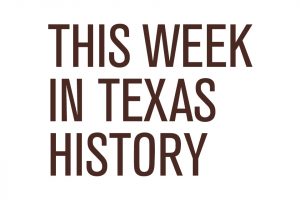By Bartee Haile
Choosing his words carefully after an all-day meeting with railroad representatives on May 25, 1949, Mayor T. Leo Moore refrained from declaring victory in his protracted struggle with the Fort Worth & Denver but did maintain the train would continue to stop at Electra under certain circumstances.
How did a small town west of Wichita Falls and a drop kick from the Red River end up with the same name as the daughter of King Agamemnon of Trojan War fame? Few of the folks, who in 1902 chose to call their settlement Electra, had read Homer. Instead, they wanted to pay their respects to rancher W.T. Waggoner by borrowing the name of his “little” girl known for her beauty and wild parties.
Sometime in the late 1930s, T. Leo Moore, a former circus roustabout, brought his big-top flair to a place that already had a colorful past. After Clayton No. 1 came in a gusher on April Fool’s Day 1912, Electra experienced the best and worst of the oil boom cycle. Within weeks, the population increased five-fold from the original thousand and peaked at around 6,700 in 1936.
With his outgoing and often overpowering personality, Moore took to politics like a duck to water. In 1940 he ran for the office at the top of the local ticket and won. Voters had no way of knowing they had elected Electra’s never-say-die champion.
While still in his first two-year term, Mayor Moore got into a nasty dispute with railroad commissioner Jerry Sadler over “allowables” or how much oil the state regulator permitted wells to pump. After Sadler resigned to enter WWII military service, Moore campaigned as the West Texas candidate to replace him but finished a disappointing sixth in a field of 11.
The mayor stayed close to home and out of the public eye until the fall of 1948, when the Fort Worth & Denver unveiled a plan to streamline the service of “The Zephyr,” its Cow Town-to-Amarillo passenger express, by relegating Electra and half a dozen other towns to “flag” or whistle stops. But rail executives backed down as soon as Moore threatened to impose a 15 mile-an-hour speed limit and to seek a court injunction that would force all trains to come to a complete stop at the station.
The dust had hardly settled before the FW&D revived the controversial plan the next April. The mayor’s aggressive response attracted not only statewide but national attention such as the following excerpt from the May 9, 1949 issue of Time magazine:
“To protest making Electra a whistle stop for express trains, he had thousands of plastic whistles molded into the shape of locomotives. He made a trip to the state capital at Austin, passed them out to the governor and the legislature (legislators cheered him admiringly and blew their whistles in chorus). Then he demanded a special hearing by the Texas Railroad Commission.”
The commissioners pacified the pest by letting him have his say, but Moore’s impassioned plea did not change the minds that mattered. After the watchdogs gave the FW&D official permission to reduce the targeted towns to “conditional” stops, the mayor mobilized his forces for a headline-grabbing showdown.
Grinning from ear to ear, Moore stepped off the “Texas Zephyr” at Electra on May 14, 1949 to the cheers of his constituents and hundreds of supporters from Chillicothe, Vernon and other communities in the affected area. “We are going to win!” he shouted in his carnival-barker baritone. “We’re not going to be a whistle stop!”
A group of women had just enough time — six whole minutes — to board the train and pass out complimentary cakes to the passengers before the engineer blew his whistle and “The Zephyr” chugged out of the station. As the train disappeared in the distance, Moore bravely told the crowd of three thousand, “This fight isn’t over yet.”
But in truth it really was. Anyone who knew T. Leo Moore could tell from his subdued demeanor and crestfallen appearance at the May 25 press conference in Dallas that he realized he had lost. Even though he described the terms of the agreement with the railroad as “liberal,” there was no denying the fact Electra faced an uncertain future as a “conditional” whistle stop.
As far as Texas and the country were concerned, Moore was yesterday’s news. In Electra he remained the mayor, a hero to many but a buffoon to others who believed his antics had embarrassed the town.
In 1951 Moore was subpoenaed to testify before the Crime Committee of the Texas House of Representatives investigating alleged inroads by organized crime in the Lone Star State. According to an Associated Press report, he “suffered a heart attack soon after telling the committee his life wouldn’t be worth a plugged nickel if he related some things he knew in an open meeting.”
Coincidence or not, Moore was beaten two-to-one in his bid the next year for a sixth term as mayor of Electra. The over-the-hill celebrity tried one last time in 1960, five years before his death, but garnered a trifling third of the vote.
Bartee welcomes your comments and questions at P.O. Box 152, Friendswood, TX 77549 or haile@pdq.net and invites you to visit his web site at barteehaile.com.






